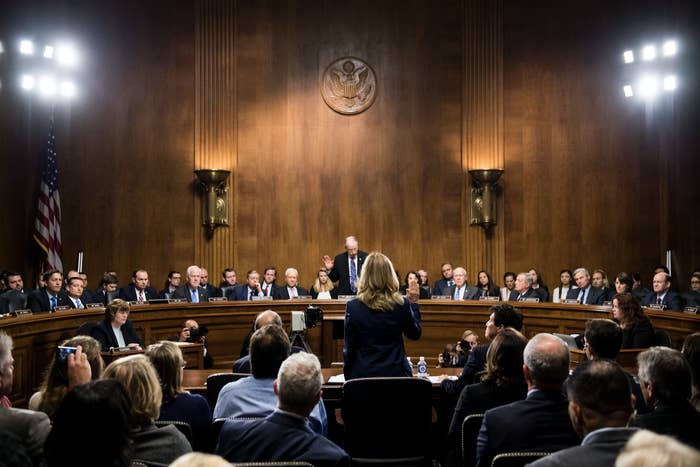
I have had the same dream every night since Christine Blasey Ford was called to testify before the Senate Judiciary Committee. I’m sitting before an all-male panel and a swarm of cameras that will broadcast my story — a painful, personal story I’ve recounted only in therapy — to everyone I know and millions of others I don’t.
Make no mistake: Ford was not alone at the stand today. Millions of women traumatized by sexual violence in this country and across the world were alongside her. Her story is all too familiar to so many of us, and we relived its trauma with her, as we have relived it so many times before.
My story is eerily similar to Ford’s — even beyond the very obvious. Like Ford, I was 16 at the time. I was also at a party. I was drunk, and so was he. I was also pinned down and my screams also stifled. I didn’t tell my parents or go to the authorities. (I didn’t even seek medical attention for my bloodied head or the grotesque patchwork of bruises across my body.) I didn’t think anyone would believe me, and I was too emotionally, physically, and spiritually broken to try to convince them.
For so many women, Brett Kavanaugh is the sexual predator we wish we’d never met at that party when we were 16. He’s the night terror we wish we didn’t return to years later. And more importantly, he’s a man who stands to wield exceptional power, especially over the lives of women — a constant reminder of the belligerent drunk man who feels entitled to our bodies. One such predator has already been elected to the presidency; are we willing to allow another such influence, this time for life?
Media coverage of Kavanaugh’s confirmation exploded when Ford stepped forward last week, and I’m glad it’s getting the attention it deserves. But I began losing sleep over this long before the recent buzz, when his candidacy was first announced. Trump vowed that Roe v. Wade would be overturned as he compiled his short list of candidates, and while I have relived my sexual assault a thousand times, I was lucky to have had a choice over the pregnancy that resulted from it.
In today’s political climate, I agonize over the fate of Roe and all the women who may have that choice taken away. As we uncover Kavanaugh’s past, I am hardly surprised to find a toxic man lies beneath the toxic politics he was selected for.
So let me say again, clearly: This case is about women, and especially those disproportionately victim to sexual violence — women of color, trans women, and queer women, among other marginalized groups. It is about believing the women who have been bold enough to brave storms of scrutiny, character assassinations, and death threats like Ford, Deborah Ramirez, Julie Swetnick, and before them, Anita Hill. It is also, however, about believing that women can make difficult choices over their bodies and that those we choose to represent us politically should believe that too.
It has taken me six years to feel comfortable sharing my story on social media, where a couple dozen, perhaps a couple hundred people will read it — I cannot imagine sharing it with the same male-dominated Senate committee that publicly debased a similarly bold woman with a similarly difficult story 27 years ago. But I do know what it is to be haunted by sexual assault years after the fact, and to withhold my story out of fear.
I share it now, in its crudest form, because the hearing today and the confirmation process to follow are deeply personal — for me and for so many women. My media presence is limited, and never this intimate. I’m under no illusion that my words will radically change the political landscape. Rather, I hope my story helps you, the reader, understand how the experiences of Ford and Anita Hill are the experiences of ordinary women everywhere. What happened to them happened to #MeToo, and it’s happened to at least one woman in your life too.
Celina Scott-Buechler is pursuing graduate studies in atmospheric science at Cornell University.
